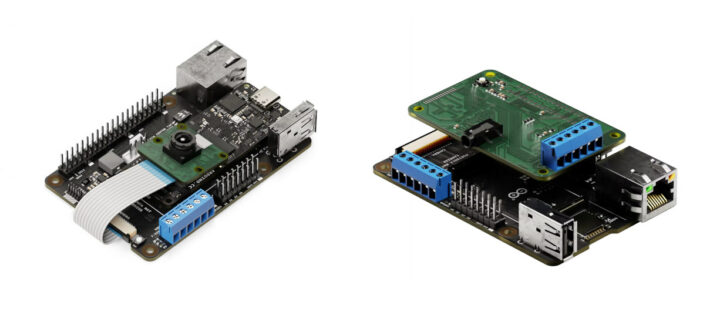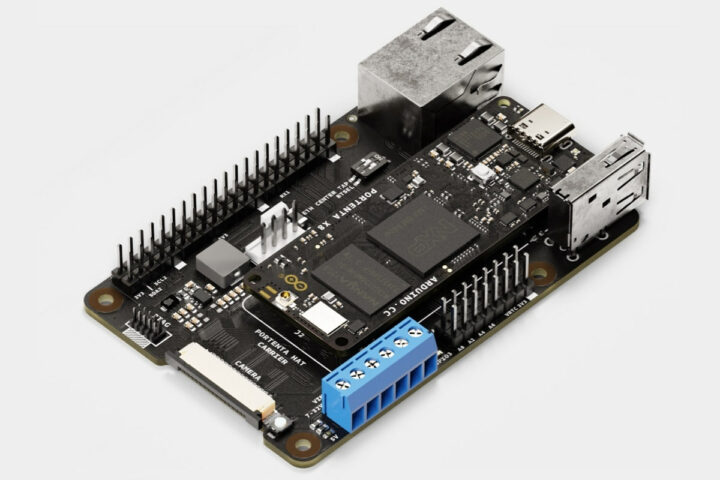The Arduino Portenta Hat Carrier board aims to interface the Linux-capable Portenta X8 board with the vast ecosystem of Raspberry Pi HAT (Hardware on Top) expansion boards.
Introduced last year, the Arduino Portenta X8 is the first Arduino Pro hardware that can run Linux thanks to its NXP i.MX 8M Mini Arm Cortex-A53 quad-core processor. But it comes in a tiny 66.04 x 25.4 mm form factor which may be great for integration into products, but for prototyping or design of products such as IoT gateways, the company has now launched the Portenta Hat Carrier that enables the board to easily connect with the Raspberry Pi HATs available today.
Portenta Hat Carrier specifications:
- Compatible with the Portenta X8 board and future Portenta with the same high-density connectors
- Storage – MicroSD card slot
- Camera I/F – MIPI CSI camera connector (CNXSoft: Arduino does not explicitly say whether it’s compatible with the official Raspberry Pi cameras)
- Networking – Low-profile Gigabit Ethernet RJ45 port
- USB – 1x USB Type-A port
- Expansion
- 40-pin header connector allowing compatibility with Raspberry Pi HATs
- 16-pin header with
- 8x analog pins
- 1x GPIO
- 1x UART without flow control
- 2x PWM pins
- 1x LICELL pin for Portenta’s RTC power
- Debugging – 10-pin 1.27mm pitch JTAG connector
- Misc
- CAN FD with onboard transceiver
- PWM fan connector
- Power Supply
- 5V from USB-C on Portenta
- 5V on 40-pin header connector
- 7-32 V DC via screw terminal
- Dimensions – 85 x 56 mm
- Temperature Range – -40°C to +85°C

The Portenta X8 runs an Arm SystemReady IR compliant, Yocto-based Linux distribution and the board also features an STM32H7 microcontroller for Arduino programming and compatibility with Arduino Cloud.
Arduino expects the Portenta Hat Carrier to be used for IoT prototyping but also to enable commercial solutions such as robot arm controllers and smart video surveillance systems that require OTA updates and SystemReady certification.
The Arduino Portenta Hat Carrier board itself sells for $45 on the Arduino store, but the Portenta X8 SBC adds $239, so it’s probably reserved for solutions where the cost of the electronics is only a fraction of the total system cost. More details may be found on the product page.

Jean-Luc started CNX Software in 2010 as a part-time endeavor, before quitting his job as a software engineering manager, and starting to write daily news, and reviews full time later in 2011.
Support CNX Software! Donate via cryptocurrencies, become a Patron on Patreon, or purchase goods on Amazon or Aliexpress





